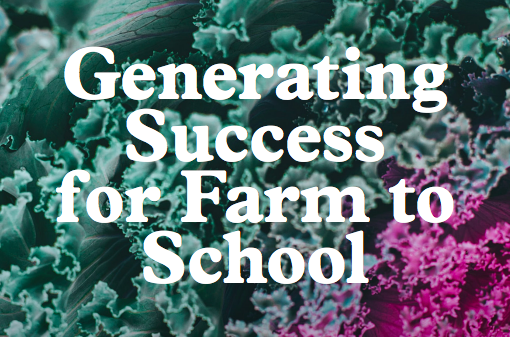George Brown College has released 2 new resources as a result of a 3-year partnership with Farm to Cafeteria Canada, Sustain Ontario and Ecosource:
- A research paper entitled Generating Success for Farm to School, written by Gary Hoyer and Chinh Do. This paper explores the many benefits of the farm to school approach and illustrates how schools are an optimal venue for supporting student health & wellness, the community, the environment, and the economy.
- Fresh & Local Farm to School: Snack Recipe Cookbook, Student Workshop & Lab Manual: Recipes created by faculty and students for use at workshops delivered to middle and secondary schools and a cooking manual.
The Generating Success for Farm to School paper is divided into two parts:
Part one summarizes the results of a survey and follow-up interviews that asked farm to school stakeholders across Canada to identify their activities, goals, best practices and conditions necessary to support farm to school programs including lessons learned.
Stakeholders identified a number of variables that are important for farm to school program success including: obtaining support, aligning activities, engaging students, ensuring that the local foods that are produced are those students will want, connecting with the community, and getting commitment from administrators.
A key takeaway: “building consensus for these activities, including support from policymakers, administrators, and the entire community of stakeholders is key to their success and sustainability.” (pg. 34)
Part two presents a comprehensive review of existing evidence-based research on the benefits of a healthy diet, nutritious meals, sourcing local food, and food literacy education that relates to both school meal programs and farm to school activities.
The research literature that was reviewed relates to three types of benefits, as well as many sub-benefits (see pages 37-38), that have been extensively and independently researched and verified:
(1) Health and wellness for students;
(2) Improved academic performance for students;
(3) Enhanced local economic activity.
The paper cites many compelling studies as evidence:
- “According to Lillico et al., (2014), healthy eating in childhood and adolescence is important for proper growth and development and to prevent various health conditions. It may also reduce the risk of chronic illness developing later in life. Access to healthy food is vital and school meals and F2S activities should play important roles.” (page 39)
- “Studies show that children who participated in after school gardening activities were more likely to increase their food literacy and consumption of fruits and vegetables, practices that contribute to a foundation for a healthy adulthood (Hermann et al., 2006).” (page 62)
- In addition to instilling healthy eating habits that can last a lifetime, the paper explains that “Farm to school and farm to cafeteria programs increase access to and consumption of local and sustainably produced foods – particularly fresh fruits and vegetables that in turn, contribute to community food security and local sustainable farming and food systems.” (page 109)
With the significant health and educational benefits that come from improved student nutrition and local food education, and the associated benefits for our communities and economy, the paper advocates for Canada to institute a universal healthy school food program with a farm to school approach. The paper states that “Both are necessary, without nutritious food and a good food literacy education, including the hands-on learning of F2S, children’s health and well-being and academic success will likely suffer,” the introduction of the paper shares. “A national cost-shared universal school meal program will provide access to healthy food for students and Farm to School activities will buttress and enhance those benefits as they connect the community.”
The paper urges advocates and stakeholders in Canada to come together in areas of health and child nutrition, school meal programs and farm to school. The report also identifies a need to continue to verify, through evidence-based research, how these programs achieve significant benefits that outweigh their costs and the complexities of instituting them.
“Schools are in a unique position to provide students with opportunities to learn about and practice healthy eating behaviours,” the paper concludes. “Improvements to student nutrition through a universal healthy school food program could translate into health and educational benefits that drive larger economic gains. Adding Farm to School initiatives will offer more benefits to students, the community, and the local economy. We must work to affect engagement and policy and make this a reality.”





